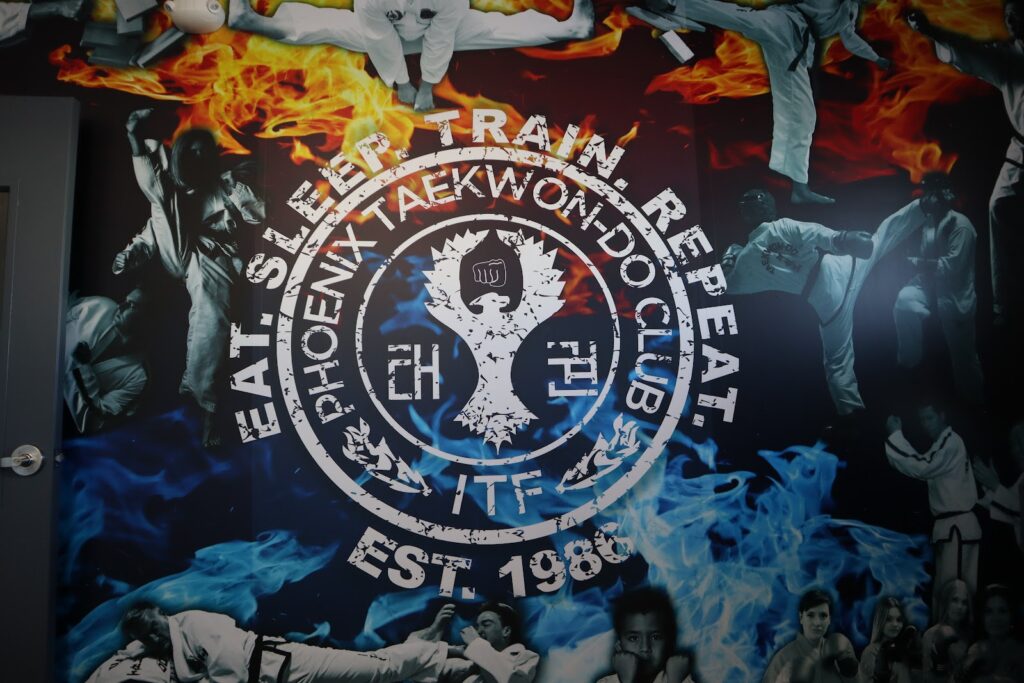Introduction
Confidence is one of the most valuable traits a child can develop. It impacts how they approach challenges, interact with peers, and handle setbacks in life. However, confidence is not something children are simply born with—it must be nurtured through encouragement, achievement, and positive reinforcement.
Taekwon-do is one of the most effective activities for building confidence in children because it provides structured goal-setting, consistent positive reinforcement, and a supportive learning environment. At Phoenix Martial Arts Club, we use proven teaching methods that help children feel capable, motivated, and self-assured.
We will explore how Taekwon-do builds confidence in kids through the power of positive reinforcement, shaping them into resilient, self-assured individuals.
1. Why Positive Reinforcement is Key to Building Confidence
Understanding Positive Reinforcement
Positive reinforcement is the process of encouraging and rewarding desired behaviors to strengthen them over time. In Taekwon-do, this means recognizing and celebrating effort, improvement, and persistence rather than just focusing on perfection.
When children experience consistent encouragement and acknowledgment, they:
- Develop a strong sense of self-worth.
- Feel motivated to keep learning and improving.
- Become more willing to take on new challenges.
How Negative Feedback Can Harm Confidence
While constructive criticism is necessary for growth, constant negative feedback without encouragement can:
- Create self-doubt and fear of failure.
- Reduce motivation and enthusiasm for learning.
- Make children hesitant to try new things.
Taekwon-do balances teaching discipline and skill development with positive reinforcement, ensuring that children feel supported rather than discouraged.
2. Goal-Setting and Achievement Through Belt Progression
How the Belt System Boosts Confidence
One of the most powerful ways Taekwon-do builds confidence in kids is through the structured belt ranking system. Each new belt represents a milestone of progress, reinforcing the idea that effort leads to achievement.
- Setting Goals – Children learn to work toward earning their next belt, teaching them goal-setting skills.
- Achieving Success – Each time a child advances in rank, they experience a sense of accomplishment and personal growth.
- Learning Resilience – Even if they struggle, they learn that persistence and dedication lead to progress.
Why This Builds Lifelong Confidence
- Children learn that small, consistent efforts lead to big results.
- They develop a sense of pride in their abilities.
- They build self-motivation, knowing that success comes from their own hard work.
This lesson extends beyond martial arts, helping children develop the confidence to tackle academic challenges, social situations, and personal goals.
3. Encouragement from Instructors and Peers
The Role of a Supportive Instructor
At Phoenix Martial Arts Club, instructors play a crucial role in boosting children’s confidence by:
- Providing consistent encouragement for effort and improvement.
- Offering constructive feedback in a way that motivates rather than discourages.
- Recognizing small successes, such as improving technique or showing good focus in class.
Peer Support and Positive Reinforcement
Unlike some competitive sports where children may feel pressure to outperform others, Taekwon-do fosters a sense of camaraderie where students encourage and support one another.
- Older students mentor younger ones, reinforcing leadership skills.
- Sparring partners help each other grow, rather than seeing each other as opponents.
- Classmates celebrate each other’s progress, creating a positive, team-oriented environment.
When children feel supported by both instructors and peers, they gain confidence in themselves and their abilities.
4. Overcoming Challenges in a Safe, Structured Way
Building Confidence by Facing Fears
One of the best ways to develop confidence is by overcoming challenges in a supportive setting. Taekwon-do provides a controlled environment where children can:
- Try new techniques without fear of failure.
- Face challenges step by step, rather than all at once.
- Learn that mistakes are part of growth, rather than something to fear.
How Sparring and Testing Build Self-Assurance
Sparring and belt tests teach children how to handle pressure and uncertainty in a positive way. By facing challenges such as:
- Performing in front of others,
- Learning how to react in sparring situations,
- Managing nervousness before a belt test,
They develop the confidence to face real-world situations with calmness and determination.
5. Teaching Kids to Handle Failure in a Positive Way
How Taekwon-do Reframes Setbacks as Learning Opportunities
A key part of confidence is resilience—the ability to bounce back from failure. In Taekwon-do, children learn:
- Failure is not defeat—it is an opportunity to improve.
- Mistakes are part of the learning process, not something to be ashamed of.
- Persistence and effort matter more than immediate success.
Why This is Essential for Life
- Helps children handle challenges in school without fear of making mistakes.
- Encourages a growth mindset, where they focus on improvement rather than perfection.
- Teaches them that success comes from effort and adaptability, not just natural ability.
By learning how to embrace setbacks in a supportive environment, children develop the confidence to keep trying, no matter the obstacle.
6. Physical Fitness and Confidence in One’s Abilities
How Strength and Coordination Improve Self-Esteem
When children see their bodies becoming stronger, faster, and more flexible, they begin to feel more confident in their physical abilities.
- Improved coordination and agility help them feel more in control of their movements.
- Increased strength and endurance give them a sense of physical capability.
- Practicing self-defense skills makes them feel empowered and prepared.
Why This Matters Beyond the Dojo
- Children who feel strong and capable are less likely to feel intimidated by challenges.
- Increased physical confidence leads to greater participation in other activities, such as sports and outdoor play.
- Learning self-defense skills helps children walk with confidence and self-assurance.
By developing both mental and physical confidence, Taekwon-do helps children believe in themselves and their abilities.
7. How Parents Can Reinforce Confidence at Home
Parents play a crucial role in helping their child’s confidence grow. Here are some ways to support their progress in Taekwon-do:
Encourage Effort, Not Just Results
- Praise their commitment to training, not just winning or earning belts.
- Recognize improvements in focus, discipline, and technique.
Help Set Realistic Goals
- Work with them to set small, achievable goals that build confidence over time.
- Celebrate progress at every stage, no matter how small.
Promote a Growth Mindset
- Teach them that mistakes and failures are learning opportunities.
- Reinforce the idea that perseverance leads to improvement.
By supporting their child’s martial arts journey, parents help reinforce the confidence-building benefits of Taekwon-do.
8. How to Get Your Child Started in Taekwon-do
If you want your child to develop confidence, self-discipline, and a strong sense of self-worth, Taekwon-do is the perfect activity.
Steps to Enroll Your Child:
- Find a supportive martial arts school with experienced instructors.
- Attend a trial class to ensure the program is a good fit.
- Encourage consistency and effort, helping them stay committed to their progress.
At Phoenix Martial Arts Club, we focus on positive reinforcement, structured goal-setting, and a supportive environment to help children become confident, capable individuals.
To book a free trial class, visit phoenixmartialartsclub.ca today.
Conclusion
Taekwon-do builds confidence in children by using positive reinforcement, goal-setting, and structured challenges to help them grow. Through:
- Encouragement and support from instructors and peers,
- Achievement through belt progression,
- Learning to handle challenges and setbacks,
- Physical fitness and self-defense skills,
- Developing self-reliance and perseverance,
Children gain lifelong confidence that extends beyond the dojo.
Give your child the gift of confidence—enroll them in Taekwon-do today.

